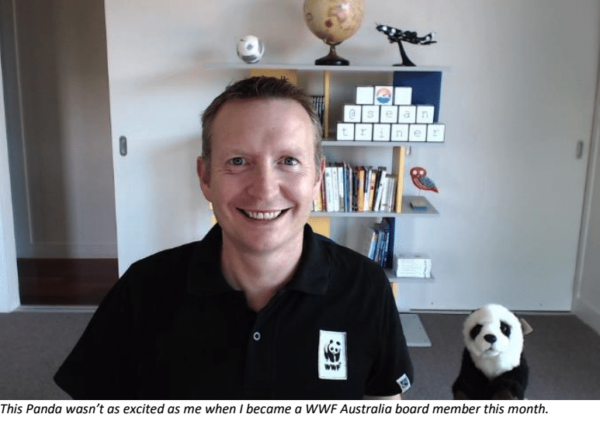These days I work with boards, CEOs, CFOs (and North American equivalents like VPs) as much as I do with fundraisers. These people rarely have a fundraising background. The success of the organisation tends to depend on whether these non-fundraiser leaders, who have responsibility for fundraisers, respect their fundraisers and recognise the gaps in their own knowledge.
I am also on the board of two charities – ChildFund New Zealand and WWF Australia.

Unlike law, accountancy, medicine or other professions, fundraising DOESN’T tend to command the same level of respect, and many bosses think they know how fundraising works when, put bluntly, they don’t.
For example, imagine a senior management or board meeting…
- A legal issue comes up. In the meeting, the group asks management and the relevant specialist pertinent questions. An agreement is reached.
- A financial process issue comes up from management. In the meeting, the group asks management and the relevant specialist pertinent questions. An agreement is reached.
- A research project issue comes up from management. In the meeting, the group asks management and the relevant specialist pertinent questions. An agreement is reached.
- A fundraising issue comes up from management. In the meeting, the group asks management and the relevant specialist pertinent questions. They then all disagree, add lots of ideas like ‘we need younger people’ or ‘we should mail less often’ or ‘I don’t like these long letters’. Everyone seems to know how to fundraise. The fundraising staff must go away and reassess their plans.
Does that sound familiar?
As fundraising professionals, we need to be challenged and pushed – but we are also working in a job that has its own body of knowledge with plenty of best practice, test results, books, magazines and training available.
How do we fundraisers fix this?
My Seven-Point Guide
1) Know your skill gaps.
Make sure you, dear fundraiser, know what YOUR gaps are. Acknowledge what you don’t know.
Do a list. Here’s what to do if the list of what you know is bigger than what you don’t: Add in the what you don’t know list “I really don’t know how much I don’t know!” No credit to Donald Rumsfeld but I know there is more you don’t know than what you do know! It is the same for all of us.
2) Don’t make fundraising up. Fill those gaps.
Read, go to courses, webinars, and conferences.
Fight for training budget – and if you fail two budget rounds in a row to get the training you need, quit because your charity will not meet its beneficiaries needs effectively. If they are not investing in you, you are in the wrong job. Even if you are a volunteer or for a small charity, your cause MUST invest in learning.
3) Demonstrate the body of knowledge.
Demonstrate that if people want to argue, they are not just arguing with you, but many other experts too.
Please DO NOT interpret this to mean you shouldn’t be challenged! Just show what you have learned.
In papers, proposals, budgets put in references to bodies of knowledge.
For example, from a digital strategy fundraising paper:
‘Our fundraising creative needs to demonstrate need, clearly and immediately. We cannot be portraying nice and happy pictures all the time – we have to show the truth (See Jeff Brooks, Sean Triner, Tom Ahern…)’
4) Circulate learning to those who make decisions about your budget. For two reasons.
- Because you really, really want them to watch/read something like Dan Pallotta’s ‘The Way We Think About Charity Is Dead Wrong’. If they do, your life will be a little easier.
- Because while it would be good if they did watch / read something, if they don’t at least you can counter with ‘I do appreciate you are busy, but the video/book/magazine I sent a couple of weeks ago summarises it. Would you like to meet out of this meeting and I can take you through this?(This will help – but only if you don’t come across as arrogant, with a ‘don’t challenge me’ attitude – personal skills are important!)
5) Constantly demonstrate there is a body of knowledge.
Have actual books with little post-it/ markers in key areas and refer to them in meetings.
Offer to lend books to other staff and even board members, and try and fill a bookshelf in your board or senior management meeting room with fundraising and relevant non-fundraising books. They will browse when waiting for meetings to start.
6) Talk to donors a lot.
Don’t underestimate the power of being able to say “I was speaking with Philippa, one of our long standing planned giving donors and she said…” Anyway, you should be speaking with donors often for other reasons so this is no extra work.
7) Get an experienced fundraiser on the board.
Preferably one from an organisation the board would respect, which usually means someone from a bigger organisation, in a similar area of work but not too similar.
Lobby your board chair / appointment committee, or if your board is elected at a members AGM lobby fundraisers to stand for election. Put serious effort into this and get your boss(es) with you. Don’t think you can’t influence this. Bring it up every time.
There are probably more than seven tips, so I would love to hear from you about others – or any stories of how you have been respected (or not) as a fundraiser in board or senior management discussions.
Sean
PS – I don’t know anyone better at understanding charity boards than Simone Joyaux. Check out her article on this topic here. A cracking read and a good book to have lying around in your board and meeting rooms is Simone’s Firing Lousy Board Members: And Helping The Others Succeed.







